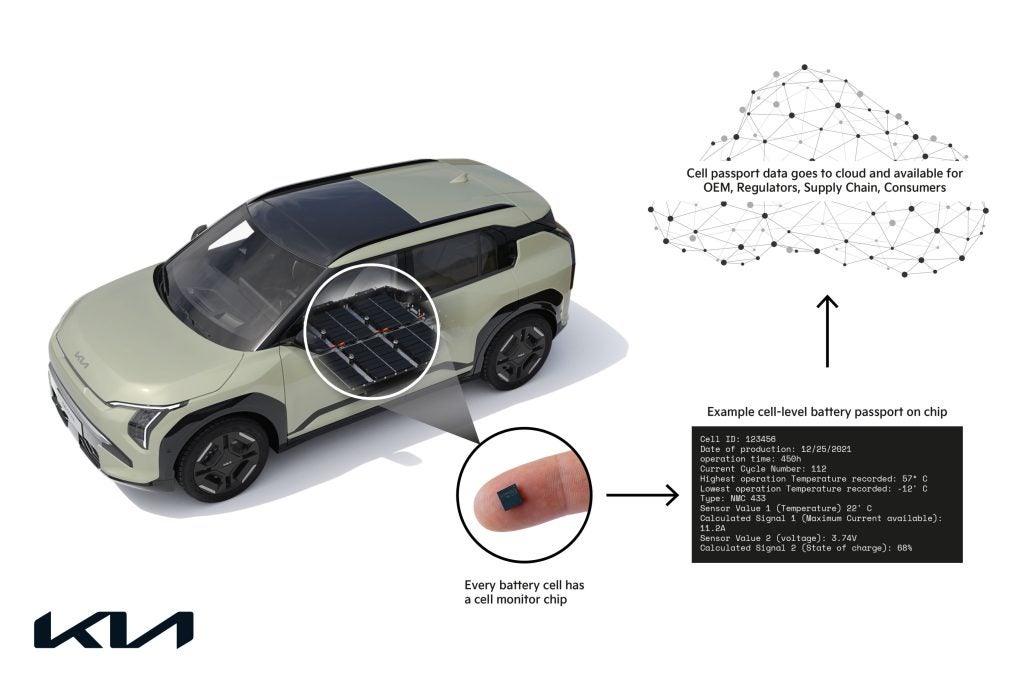
Kia Europe is conducting the first public trial of a battery passport at a cellular level as what it describes as ‘a preliminary research’. It says the breakthrough ensures transparency of EV battery health by providing live detailed data for each battery cell.

Discover B2B Marketing That Performs
Combine business intelligence and editorial excellence to reach engaged professionals across 36 leading media platforms.
A battery passport enables live State of Health (SoH) tracking, real-time repair diagnostics, and end-to-end traceability across the battery’s lifecycle. For EV drivers, Kia says, this leads to benefits such as extended battery life, more affordable maintenance, and a higher level of trust when buying or selling used EVs.
“Kia aims to set a new standard for customers regarding battery transparency and performance,” said Marc Hedrich, President and CEO at Kia Europe. “Through testing cell-level battery passports, we gain insights on what ownership benefits we can offer our customers. On top of advantages such as extended battery life, we will be building on a relationship of trust as well.”

Separate from this preliminary research, Kia has established a dedicated internal organisation, bringing together experts from across the company, to develop its own battery passport service in collaboration with partners across the EV battery value chain and related networks. The Kia battery passport will go beyond regulatory requirements by including additional safety-related data, ensuring an exemplary standard that sets a benchmark for the industry. Kia plans to provide this service for all EV/HEV models sold in Europe by February 2027, as required by the EU battery regulation.
Trial with a real Kia model
For the trial, a Kia EV3 equipped with a Dukosi battery cell monitoring system was shipped from Korea to Europe, arriving in Germany in February. The trial vehicle is capable of monitoring and transmitting live data for each cell of the battery pack and uploading it to its digital battery passport.
Once the data is uploaded, users, mechanics, and regulators, among others, can access real-time information on the battery’s SoH through the car’s infotainment system. To ensure accuracy and traceability throughout the battery’s lifecycle, the system automatically updates after any repair work. To access the battery passport data collected during the trial, a data-sharing pilot environment, developed by TNO, was utilised.
Delft University of Technology, together with Hyundai Motor Group, coordinated the collaborative passport trial. The system could also be configured for other applications, such as a different car model, interoperability with a different brand, or even application in a different sector.
A common, multi-partner European research trial for Battery Passport Maturity
Behind the battery passport trials is an EU-wide, collaborative research initiative aiming to pilot and learn about the challenges and opportunities of implementing the EU battery passport in a real-life multi-stakeholder context. Technical and back-end integration of the battery passport to ensure the data is securely transferred between the vehicle systems and stakeholders has been managed by global automotive parts vendor Hyundai Mobis and Hyundai Motor Group.
A trial, in collaboration with the EU-funded DATAPIPE project, as well as ARN (the Dutch producer responsibility organisation for the end-of-life treatment of cars and their batteries), explored how digital product passports could potentially be beneficial in the future. Currently, the EU battery passport comprises more than 100 data attributes.
Better for customers
Compared to conventional monitoring systems that only measure SoH of the entire battery pack or module, Kia’s research gathers and displays data for each cell. This in-depth data collection delivers various benefits to customers. With real-time SoH insights, customers can identify and address maintenance issues early. This can lead to extended battery life and reduced long-term costs.
The battery monitoring’s enhanced precision also enables targeted cell-specific repairs. This allows individual cells to be replaced instead of complete modules, saving both time and money. For owners of used EVs, live battery data increases trust in vehicle performance, which in turn supports higher resale values. This level of transparency informs decisions regarding battery reuse and recycling. This makes it easier to keep EV batteries on the market longer and reduce waste.




